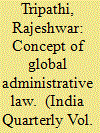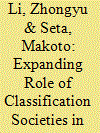|
|
|
Sort Order |
|
|
|
Items / Page
|
|
|
|
|
|
|
| Srl | Item |
| 1 |
ID:
131369


|
|
|
|
|
| Publication |
2014.
|
| Summary/Abstract |
This article analyses the characteristics of the Commission on the Limits of the Continental Shelf as an international decision-making institution in the process of establishing the seaward limits of the continental shelf beyond 200 nautical miles from the baselines of the territorial sea under Article 76 of the 1982 UN Convention on the Law of the Sea. The Commission may be compared to scientific bodies established to give advice relating to the implementation of treaty provisions. However, in the exercise of its functions, the Commission also performs legal-administrative tasks, and its recommendations to individual coastal states entail significant legal effects; for instance, as a means of interpretation under the Vienna Convention on the Law of Treaties. The Commission's functions and competencies must be taken into account in classifying and understanding this unique international institution.
|
|
|
|
|
|
|
|
|
|
|
|
|
|
|
|
| 2 |
ID:
109038


|
|
|
|
|
| Publication |
2011.
|
| Summary/Abstract |
Globalisation, which has integrated the whole world into a unit by a vast range of regulatory regime, has led to the emergence of a global state through international institutions. These institutions regulate the social, economic and political life of states. Therefore it has led to the emergence of the concept of Global Governance. This concept of Global Governance has led to development of the concept of Global Administrative Law (GAL). This GAL concept is based on the idea of understanding global governance as administration, which can be organised and shaped by principles of an administrative law character. In this way GAL is related to trans-governmental regulation and administration designed to address the consequences of globalised interdependence in such fields as security, trade conditions on development and financial assistance, banking and financial regulations, Intellectual Property Rights, Labour standards and cross-border movements of populations, including refugees. Isolated national regulations cannot govern these different areas and administrative measures and therefore various transnational systems of regulation or regulatory co-operation have been established through international treaties and organisations. To implement these regulations, transnational administrative bodies-including international organisations and informal groups of officials that perform administrative functions, are established. However these institutions are not directly subject to control by national governments or domestic legal systems or, in the case of treaty-based regimes, the states party to the treaty. However their regulatory decisions may be implemented directly against private parties by the global regime or more commonly through implementing measures at the national level. This situation has led to the question of accountability, fairness and transparency and due process in the functioning of these bodies. GAL is developed in response to this question, which attempts to extend the application of domestic administrative law to intergovernmental regulatory decisions that affect a nation.
|
|
|
|
|
|
|
|
|
|
|
|
|
|
|
|
| 3 |
ID:
188877


|
|
|
|
|
| Summary/Abstract |
Private actors and their roles in conserving the marine environment have attracted increasing attention. Although classification societies were originally designed as industrial organizations developing internal standards on hull and machinery, their contributions to the marine environmental protection should not go ignored. As exemplified by the Ballast Water Management (BWM) Convention, an international shipping instrument on ballast discharge for which the implementation process was subject to technological uncertainties, their contributions can be described in three ways: verification on behalf of states as “recognized organizations”; participation in International Maritime Organization (IMO) sessions; and establishment of their own standards. It is argued that these multiple functions reveal the competence of classification societies to tackle vessel-source pollution, and further, that their technical know-how and firsthand experience accumulated from shipping practice demonstrate their potential to address other complicated marine environmental issues where experience and compliance technologies are essential. However, the expanding focus of classification societies to marine environmental issues should proceed with caution. A much under-discussed point is the impact of classification rules and standards developed by the International Association of Classification Societies (IACS) on international shipping conventions as agreed by states. Though it cannot be said that classification societies are making their own vessel-source discharge standards independent from the IMO lawmaking process, the Unified Requirements on BWM system installation illustrate that obligations under international instruments could be de facto complemented by industrial standards, despite the fact that no provisions incorporating the latter are explicitly spelled out in the former. Given the noticeable lack of state consent throughout the private standard-setting process and the near-universal applicability of IACS standards, legitimacy concerns arise as to whether it is justified for classification societies to wield such an impact on the development of vessel-source pollution requirements, affecting both states and other maritime stakeholders. In this respect, a global administrative law perspective is taken to examine in what ways their legitimacy could be challenged.
|
|
|
|
|
|
|
|
|
|
|
|
|
|
|
|
|
|
|
|
|